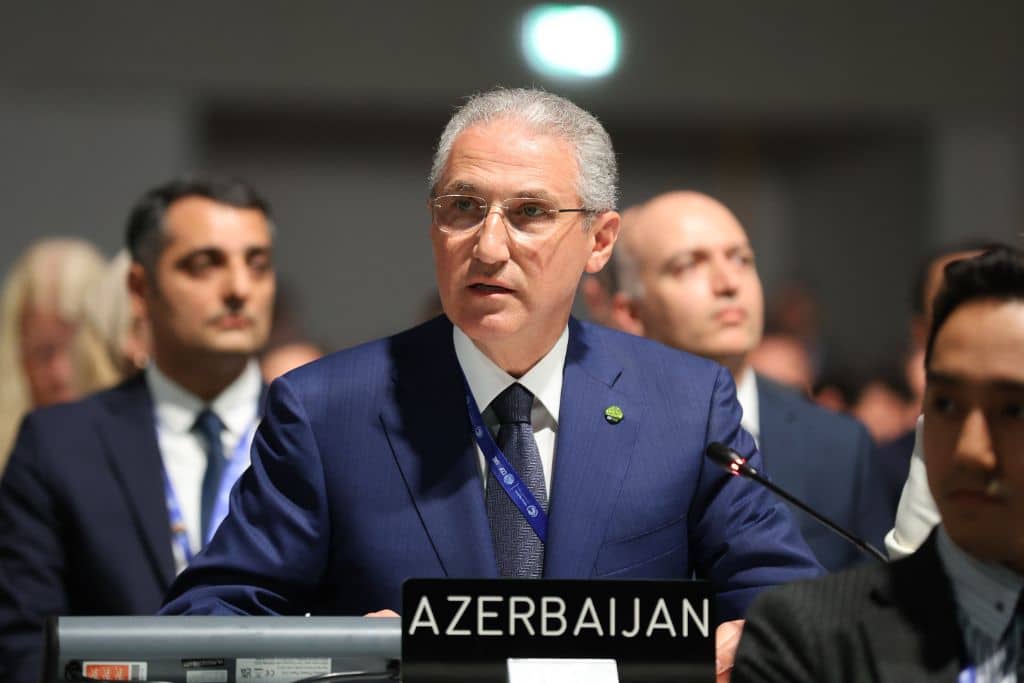Mukhtar Babayev’s appointment to preside over COP29 this November reignited debates over the role of fossil fuels in the UN’s yearly climate summits.
—
Azerbaijan’s ecology minister Mukhtar Babayev will lead the United Nations COP29 climate talks to be held in Baku in November.
Before his appointment as minister of ecology and natural resources in 2018, Babayev, a member of the ruling right-wing New Azerbaijan Party, worked at the state-owned oil and gas company Socar for more than two decades, during which he also briefly served as the company’s vice-president for ecology.
The decision was announced last week in a post on the COP28 United Arab Emirates Presidency’s X (formerly Twitter) account. “We look forward to working alongside the COP29 and COP30 Presidencies, and the UNFCCC to build on the transformative and historic success of COP28 and keep 1.5°C within reach,” the post read.
Babayev’s appointment as COP29 president reignited debates over the role of fossil fuels in the UN’s yearly climate summits, better known as Conference of the Parties (COPs). Azerbaijan is the third petrostate in a row to host the talks after the United Arab Emirates (UAE) last year and Egypt in 2022.
It is also not the first time that a COP president has ties with the fossil fuel industry. The highly-controversial COP28 summit in Dubai last November was led by Sultan Al-Jaber, head of the Abu Dhabi National Oil Company (Adnoc), a state-owned company that pumps almost all the crude oil in the UAE and produces about 3.2 million barrels a day.
Al Jaber repeatedly came under fire both in the run-up to and during the summit.
Besides repeatedly emphasised the need to phase out fossil fuel emissions, rather than production, by focussing on the development of new emission reduction technologies, he also faced huge backlash for openly denying climate science during an exchange with former Irish president Mary Robinson at a live online event in late November.

The appointment of Azerbaijan – a highly fossil fuel-dependent state and the oldest oil-producing region in the world – as the COP29 host nation came last December, following days of delicate negotiations.
Under UN rules, it was eastern Europe’s turn to take over the COP presidency, though an unanimous vote was required. Following Russia’s veto on all EU countries, delegates were left with just a few options, though not all cities on the list had the money and infrastructure needed to host a conference that every year sees tens of thousands of participants. While Azerbaijan and Armenia were initially vetoing each other, the latter eventually retracted its bid and backed Azerbaijan.
Hosting crucial climate talks in a petrostate is concerning environmentalists about the actual purpose of the summit.
An investigation by the Centre for Climate Reporting (CCR) and the BBC revealed that the COP28 presidency was planning to use meetings with foreign countries to push for oil and gas deals. Despite Al Jaber repeatedly denying his involvement, leaked documents show that fossil fuels were among the talking points in meetings between UAE energy companies and 15 nations ahead of the summit. This is further reinforced by the fact that the UAE granted access to at least 2,456 fossil fuel lobbyists and a number higher than all but one of the national delegations present in Dubai. Meat and livestock lobbyists and representatives from other planet-trashing industries have also left a mark on this year’s summit.
“To share seats with the Big Polluters in climate change conversations is to dine with the devil,” said Ogunlade Olamide Martins, Program Manager at the Corporate Accountability and Public Participation Africa (CAPPA). “This unholy matrimony will only endorse “conflict of interest” and further facilitate the silence of honest agitation. COP’s conclusions must be independent of industries’ parasitic influences and must only address the concerns of the vulnerable masses.”
Featured image: IISD/ENB | Mike Muzurakis
You might also like: Did COP28 Succeed or Fail?


















